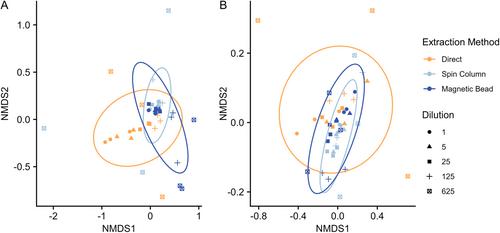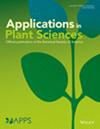The impact of extraction method and pollen concentration on community composition for pollen metabarcoding
Abstract
Premise
Plants and pollinators closely interact with each other to form complex networks of species interactions. Metabarcoding of pollen collections has recently been proposed as an advantageous method for the construction of such networks, but the extent to which diversity and community analyses depend on the extraction method and pollen concentration used remains unclear.
Methods
In this study, we used a dilution series of two pollen mixtures (a mock community and pooled natural pollen loads from bumblebees) to assess the effect of mechanical homogenization and two DNA extraction kits (spin column DNA extraction kit and magnetic bead DNA extraction kit) on the detected pollen richness and community composition.
Results
All species were successfully detected using the three methods, even in the most dilute samples. However, the extraction method had a significant effect on the detected pollen richness and community composition, with simple mechanical homogenization introducing an extraction bias.
Discussion
Our findings suggest that all three methods are effective for detecting plant species in the pollen loads on insects, even in cases of very low pollen loads. However, our results also indicate that extraction methods can have a profound impact on the ability to correctly assess the community composition of the pollen loads on insects. The choice of extraction methodology should therefore be carefully considered to ensure reliable and unbiased results in pollen diversity and community analyses.



 求助内容:
求助内容: 应助结果提醒方式:
应助结果提醒方式:


